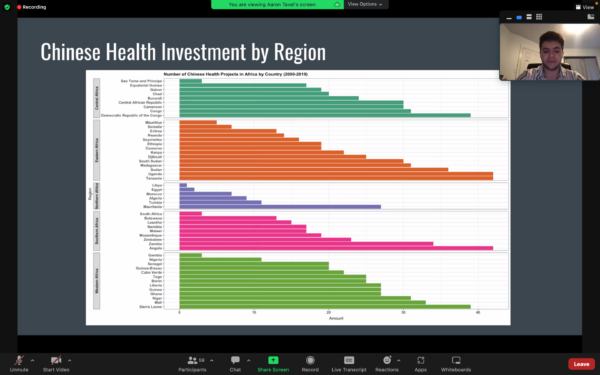More Where that Came From: Breaking Down GRI’s Summer 2022 Showcase Presentations
By: Adriana Shi ’24, GRI Communications Assistant
With the end of summer on the horizon, GRI student researchers gathered virtually to share current projects with members of the GRI community at the Summer Research Showcase. Each lightning talk highlights a unique area of research taking place at the Institute. But consistent throughout all of these presentations was a sense of passion and commitment, which inspired researchers to take on unexpected opportunities and challenges.
Bilen Zerie ‘23 said she never expected to co-author a paper when she first joined the International Justice Lab. But this summer, as she and co-author Alexandra Byrne ‘23 wrapped up research and finalized their forthcoming paper on truth commissions and memorialization, she defied her own expectations. Zerie presented on the initial theories of the project at the 2021 Summer Showcase, and saw this year’s event as an opportunity to highlight the project’s growth.
“At this point last year, we hadn’t analyzed the data yet, and we hadn’t even finished data collection,” she said. “This presentation was giving a fuller picture about how the data we found match up with our original theories. It was nice to look back from the end and see how this project has progressed.”
Through coding, the pair, alongside other IJL Fellows, “took about 200 memorialization recommendations across 28 countries from 1970 to 2018” and various truth commissions to evaluate their original theories, hoping to fill a gap in transitional justice research. Specifically, Zerie hopes their work will start tackling questions such as “What role do memorials of the past have in society now?” and “How can we instate new memories that the public is happy with and that are effective in remembering past violence and making sure it doesn’t happen in the future?”
“Memorialization hadn’t really been studied at a granular level,” Byrne said. “Many scholars had not been able to look at memorialization proposals — they’ve been looking at final projects. We noticed that truth commissions make a lot of recommendations about how society should remember their past. We found that these are amazing blueprints to actually look at projects before they’re completed, and track them through implementation.”
Ignite Research Assistant Aaron Tavel ‘24 also hopes to add a unique voice to his area of research: Chinese health investments in Africa. As a shift away from traditional donors has taken place over the last several years, this opens up a conversation about what the future of public health may look like in Africa. Tavel’s work this summer investigates how epidemiological, geographical, and socio-economic indicators impact the likelihood of Chinese investment. One of the factors he analyzed was tuberculosis incidence rate.
“The adjusted odds ratio for tuberculosis incidence indicates that there is a decreased chance of China investing in a state during a certain year if they have a tuberculosis incidence greater than 100,” he said. “That’s pretty interesting — why is China investing away from these countries?”

Tavel worked alongside Ignite Global Health Lab’s Post-Doctoral Fellow, Julius Nyerere Odhiambo, to analyze factors that contribute to Chinese health investment in Africa.
When first approaching the project, Tavel intended on using geo-coded project level data but ultimately had to switch gears to national–level data. While this provides a broad overview on Chinese investments in each country, he is exploring ways to tackle the original roadblock to provide insight to sub-national decision making as he continues his research into the fall.
“We realized that if there was a hospital in [one area of] Africa … it’s going to have spillover effects to other countries surrounding it,” he said. “There are also more developed and less developed areas. So it’s important when we’re looking at the future of African public health [to look at project level data]. Where is China investing in? Are they focusing their investments in low-developed areas of the country or places near mines where they may have employees work?”
Abby Stern ‘24 also adapted to new circumstances during the initial weeks of summer research. She traveled to Georgia with four other Summer Fellows to conduct interviews with Georgian veterans who served in Iraq or Afghanistan alongside U.S. veterans. These interviews will contribute to a larger project spearheaded by Associate Professor of Government Daniel Maliniak, who looks to track the relationship between the United States and the Republic of Georgia since its independence. During the initial outreach stage, the team was faced with dead ends and a lack of responses.
“Once we did connect with people though, the ball started rolling,” Stern said. “People were so willing to just sit down with us for an hour and a half or two hours and just share absolutely everything. At the end of each interview, everyone we talked to wanted to connect us with more people. It was just this ripple effect.”
This opportunity to gather primary data proved to be crucial in addressing the research question, as the COVID-19 pandemic and ongoing war in Ukraine has heavily impacted the country’s political state. The team asked questions about service abroad, NATO and EU integration, and Georgian domestic politics.
“Some of the key preliminary takeaways include the willingness of Georgia to prove that they are an asset to the US by serving in combat situations such as Iraq and Afghanistan, and their eagerness to serve alongside US military in combat because of the experience that they gained serving with US military officials,” Stern said.
This fall in Williamsburg, the team will continue to conduct interviews while also moving on to data analysis to qualify interviewee responses.
These projects cover only a fraction of the research taking place at GRI. Watch the full showcase for research ranging from democratic backsliding in Tunisia to new residential investment and gentrification in New York City neighborhoods.




No comments.
Comments are currently closed. Comments are closed on all posts older than one year, and for those in our archive.